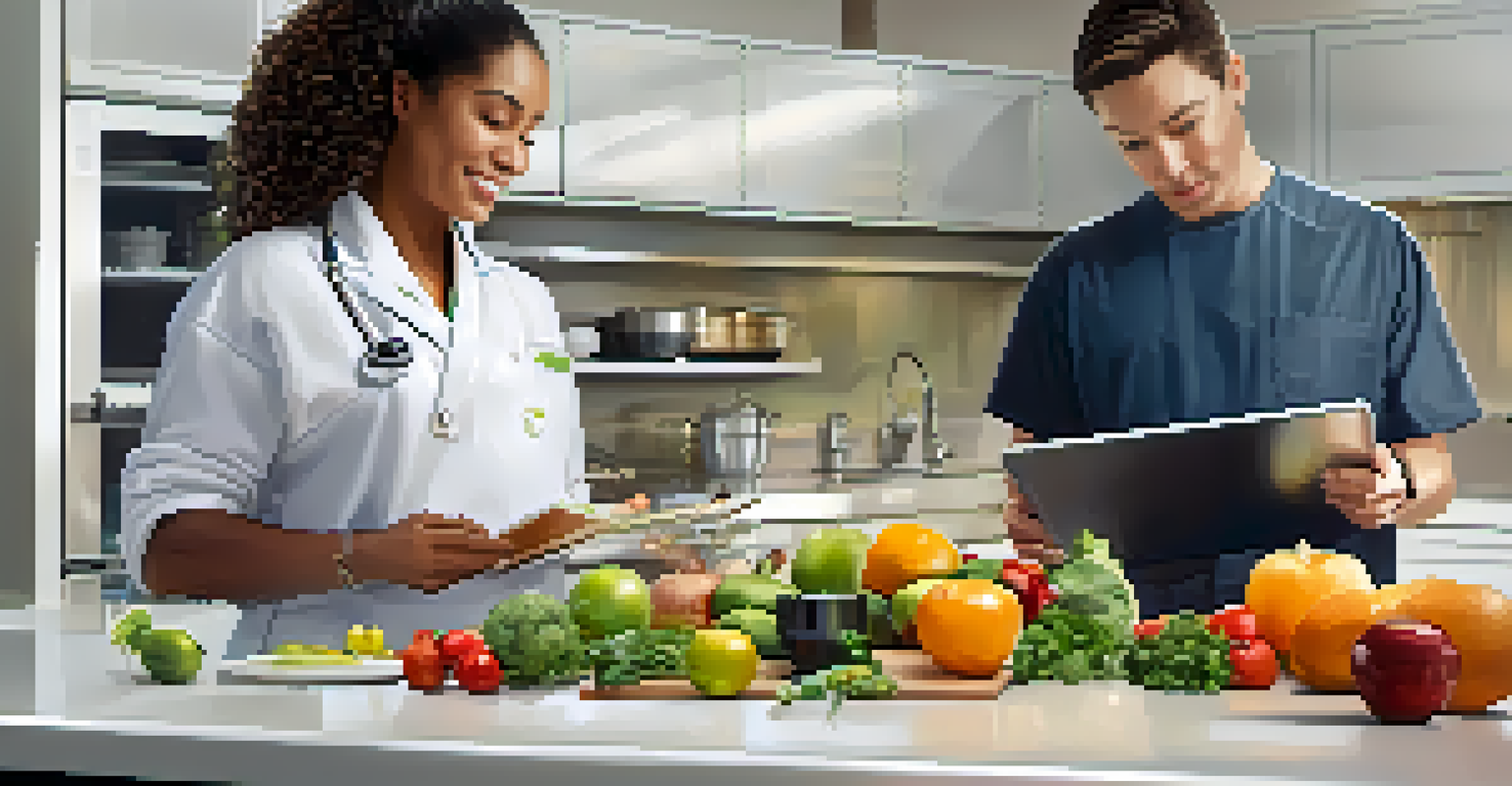Culinary Medicine: Enhancing Patient Outcomes Through Diet

What is Culinary Medicine and Its Importance?
Culinary medicine is an emerging field that blends the art of cooking with the science of nutrition. Imagine a world where doctors not only prescribe medication but also recommend specific foods to enhance health. This approach recognizes that what we eat plays a crucial role in our overall well-being, making it a vital component of patient care.
Let food be thy medicine and medicine be thy food.
At its core, culinary medicine aims to empower patients with knowledge about their food choices. By teaching them how to prepare delicious, nutritious meals, healthcare providers can help patients take charge of their health. This proactive stance shifts the focus from merely treating diseases to preventing them through dietary interventions.
The importance of culinary medicine cannot be overstated, particularly in a society where chronic diseases like diabetes and heart disease are prevalent. By integrating culinary skills with medical advice, we can create a more holistic approach to health that resonates with patients on a personal level.
The Science Behind Culinary Medicine
Culinary medicine is grounded in scientific research that links nutrition to health outcomes. Studies show that certain foods can reduce inflammation, improve gut health, and even enhance mental clarity. With this knowledge, healthcare providers can tailor dietary recommendations to individual patient needs.

For example, incorporating omega-3 fatty acids from fish can be beneficial for heart health, while foods rich in antioxidants, like berries, can bolster the immune system. By understanding these connections, practitioners can integrate food as a therapeutic tool in their practice. This evidence-based approach helps patients see the tangible benefits of their dietary choices.
Culinary Medicine Empowers Patients
By combining cooking skills with nutritional knowledge, culinary medicine helps patients make informed food choices for better health.
Moreover, culinary medicine encourages patients to move beyond calorie counting and embrace a more enjoyable way of eating. It emphasizes whole foods and cooking techniques that enhance flavor and nutrition, making healthy eating not just a necessity but a delightful experience.
Benefits of Culinary Medicine for Patients
One of the most significant benefits of culinary medicine is its ability to improve patient outcomes. By focusing on nutrition, patients often experience better management of chronic conditions, weight loss, and improved energy levels. It's not just about feeling good; it's about living better.
The doctor of the future will no longer treat the human frame with drugs, but rather will cure and prevent disease with nutrition.
Additionally, culinary medicine fosters a sense of community and support among patients. Cooking classes and group activities can build connections, encouraging individuals to share their progress and challenges. This communal aspect can motivate patients to stick to their dietary changes.
Lastly, the empowerment that comes from learning to cook healthy meals can lead to increased confidence in making food choices. When patients understand how to prepare nutritious dishes, they are more likely to adopt these habits long-term, ultimately enhancing their quality of life.
Culinary Medicine in Practice: Real-World Examples
Culinary medicine is not just a theoretical concept; it's being implemented in various healthcare settings across the globe. For instance, some hospitals have started offering cooking demonstrations as part of their patient education programs. These hands-on experiences allow patients to learn about nutrition in a practical, enjoyable way.
Another example can be found in community health initiatives that focus on teaching families how to prepare healthy meals on a budget. By providing resources like recipes and cooking tips, these programs empower individuals to make better food choices without breaking the bank. This approach not only improves health but also fosters a sense of community.
Technology Enhances Culinary Medicine
Mobile apps and online platforms provide personalized meal planning and nutrition guidance, making healthy eating more accessible.
Moreover, some healthcare providers are now collaborating with chefs to create meal plans that cater to specific health conditions. This partnership ensures that meals are not only nutritious but also flavorful, making it easier for patients to embrace dietary changes.
Addressing Challenges in Culinary Medicine
While culinary medicine holds great promise, it does face some challenges. One significant hurdle is the lack of training for healthcare providers in nutrition and culinary skills. Many doctors receive little to no education on how to incorporate food into treatment plans, leaving them ill-equipped to guide patients effectively.
Another challenge is the accessibility of healthy foods. In some communities, fresh produce and whole foods may be difficult to find or afford. This can create a gap between the ideal dietary recommendations and what patients can realistically implement in their lives.
To overcome these obstacles, ongoing education for healthcare providers is essential, as well as community efforts to improve access to nutritious foods. By addressing these challenges, we can ensure that culinary medicine reaches its full potential in enhancing patient outcomes.
The Role of Technology in Culinary Medicine
In our digital age, technology plays a pivotal role in advancing culinary medicine. Mobile apps and online platforms now offer personalized meal planning and nutritional guidance at the touch of a button. This accessibility allows patients to receive tailored advice and support wherever they are.
For instance, some apps provide recipes based on individual health goals, dietary restrictions, and personal preferences. This customization makes it easier for patients to find meal ideas that resonate with them, increasing adherence to dietary changes. Technology can also facilitate virtual cooking classes, expanding access to culinary education.
Culinary Medicine's Growing Importance
As awareness of nutrition's role in health increases, culinary medicine is becoming essential in delivering personalized patient care.
Moreover, wearable devices that track nutritional intake and physical activity can empower patients to take charge of their health. By combining technology with culinary medicine, we can create a more integrated approach to improving patient outcomes.
The Future of Culinary Medicine in Healthcare
As awareness of the importance of nutrition in health grows, culinary medicine is poised to become a staple in healthcare. The integration of food and medicine can lead to more personalized care, addressing the unique needs of each patient. This shift reflects a broader understanding of health that encompasses not just the absence of disease, but overall well-being.
Looking ahead, we can expect more healthcare facilities to adopt culinary medicine programs. This could include partnerships with local farms to supply fresh produce, cooking classes for patients, and even culinary training for healthcare providers. These initiatives can create a culture of health that extends beyond the doctor's office.

Ultimately, the future of culinary medicine lies in its ability to bridge the gap between food and health. By embracing this holistic approach, we can foster a healthier society, one meal at a time.